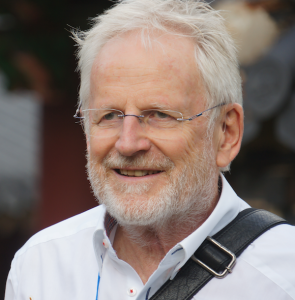Bruno Buchberger
Johannes Kepler University, Linz, Austria
Title: Grobner Bases and Macaulay Matrices
ABSTRACT
Slides
SHORT BIO:
1974 – present: Full professor of Computer Mathematics at RISC (Research Institute for Symbolic Computation), Johannes Kepler University (JKU) in Linz, Austria.
1985 – 1995: Founding editor of the Journal of Symbolic Computation.
1987 – 1997: Founder and chairman of RISC, the Research Institute for Symbolic Computation (1987) of the JKU.
1989 – 2013: Founder and director of the JKU Softwarepark Hagenberg (1000 coworkers in R&D and 1500 students, 140 millions Euro private andpublic investment), close to Linz, Austria. in a rural area. The first Softwarepark in the World!
1985 – 1995: Founding editor of the Journal of Symbolic Computation.
1987 – 1997: Founder and chairman of RISC, the Research Institute for Symbolic Computation (1987) of the JKU.
1989 – 2013: Founder and director of the JKU Softwarepark Hagenberg (1000 coworkers in R&D and 1500 students, 140 millions Euro private andpublic investment), close to Linz, Austria. in a rural area. The first Softwarepark in the World!
As an international researcher, Buchberger is best known for his invention of the theory of Gröbner bases (established in his PhD thesis 1965) providing a general algorithmic method for solving fundamental problems in non-linear polynomial systems. For his Gröbner bases theory, among other international scientific honors,
- he received the ACM (Association for Computing Machinery) Kanellakis “Theory and Practice” Award 2007;
- he was elected (1991) member of the Academy of Europe;
- he received six honorary doctorates (from the Universities of Nijmegen NL, Timisoara RO, Bath UK, Waterloo Canada, Innsbruck A, and Genova I);
- he became a member of the Austrian Curatory of Science (2015), the highest Austrian honor for scientists;
- approx. 20 textbooks and 2000 publications were written on his Gröbner bases theory and his work was cited many thousands of times (see Google Scholar);
- over 150 times he was an invited keynote speaker at international mathematics and computer science conferences.
His current main research topic is automated mathematical theory exploration (the “Theorema Project”) with application to the automation of invention and the derivation of hidden knowledge in big data.
He led numerous research and industrial projects and was / is a consultant of the Austrian and Upper Austrian Government. For his contribution to the economic and technologic development of Austria, he was elected “Austrian of the Year” 2010 (by the Austrian newspaper Die Presse) and received numerous other Austrian awards.
